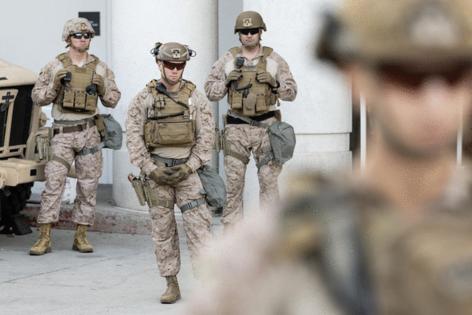Marines to leave Los Angeles, Pentagon says
Published in News & Features
LOS ANGELES — More than a month after President Trump made the fiercely contentious decision to send about 700 U.S. Marines to Los Angeles, those troops will begin withdrawing from the city, Pentagon officials said Monday.
The decision comes a week after the Pentagon announced that half of the almost 4,000 National Guard troops deployed to the Los Angeles area would be released from duty.
The Marines and National Guard were sent to the city in early June amid widespread federal immigration raids and fiery protests against the enforcement actions, with the Trump administration vowing to crack down on “rioters, looters and thugs.”
While the president contended that he had “saved Los Angeles,” local and state officials denounced the extraordinary deployment of military troops to the streets of an American city.
Advocates and California politicians also argued that the heavy-handed spectacle would be incendiary, potentially putting both the troops and protesters at risk.
The sometimes volatile protests that erupted in downtown Los Angeles and other parts of the region in mid-June have long since wound down. Some troops are tasked with guarding federal buildings, and some have accompanied immigration agents on tense enforcement actions. In recent days, they have been largely fighting tedium, without much to do.
Speaking on behalf of Defense Secretary Pete Hegseth, chief Pentagon spokesperson Sean Parnell credited the troops with helping to bring calm to the area.
“With stability returning to Los Angeles, the Secretary has directed the redeployment of the 700 Marines whose presence sent a clear message: lawlessness will not be tolerated,” Parnell said in a statement Monday. “Their rapid response, unwavering discipline, and unmistakable presence were instrumental in restoring order and upholding the rule of law. We’re deeply grateful for their service, and for the strength and professionalism they brought to this mission.”
A Defense Department official publicly estimated last month that the National Guard and Marine deployment in Los Angeles would cost about $134 million.
News of the Marines’ withdrawal, which was first reported by the New York Times, broke minutes after Los Angeles Mayor Karen Bass finished a Monday morning public appearance with veterans’ groups, where she decried the “inappropriate” presence of military forces on L.A. streets.
“This is another win for Los Angeles. As we said this morning — the way to best support our troops is to have them do what they enlisted to do, not to protect two office buildings,” Bass said in response to the withdrawal.
The raids have sown panic in immigrant communities across the Los Angeles region and become a flashpoint of division for the Trump administration.
Transit ridership in Los Angeles has plummeted, formerly bustling neighborhood spots are routinely empty and many undocumented Angelenos are skipping standard health care visits.
The pervasive chilling effect in a so-called sanctuary city may be part of the Trump administration’s goal. But recent polling suggests the immigration raids are increasingly unpopular with the public.
According to data released last week by Immigration and Customs Enforcement, the majority of people arrested do not have criminal convictions. Nearly half of those caught up in the sweeps are Mexican nationals, and many have deep ties to the U.S.
The administration has also battled escalating legal challenges targeting the raids.
In mid-July, a federal judge issued a scorching rebuke, temporarily blocking federal agents from using racial profiling to carry out indiscriminate arrests. Last week, the administration asked a federal appeals court to stay the judge’s order, which would allow immigration agents to resume unfettered raids. The appeals court will take up the stay next Monday and could rule on it by the end of the month.
Ysabel Jurado, a progressive member of the Los Angeles City Council whose district includes the downtown area, cheered the administration’s decision to withdraw the Marines from Los Angeles.
“The #SummerofResistance is working. Our federal occupation may be coming to an end here in LA but the fight against authoritarianism is far from over,” Jurado said on X, before positing that the Marines “weren’t here to quell civil unrest, they were called to incite it.”
Gov. Gavin Newsom has also contended that the president purposefully “inflamed a combustible situation.”
“There was never a need for the military to deploy against civilians in Los Angeles,” Newsom said in a statement Monday. “The damage is done, however. We, again, call upon them to do the right thing and end the militarization once and for all.”
Newsom and California Atty. Gen. Rob Bonta previously sued over Trump’s mobilization of National Guard forces to Los Angeles, but the 9th U.S. Circuit Court of Appeals found that the president had broad authority to deploy the military in American cities. Next month, a federal judge in San Francisco is expected to decide whether federalized troops violated federal law while deployed.
Roughly 2,000 National Guard troops remain in the region, according to U.S. Northern Command.
_____
(Times staff writers Sonja Sharp and Brittny Mejia contributed to this report.)
_____
©2025 Los Angeles Times. Visit at latimes.com. Distributed by Tribune Content Agency, LLC.







Comments